Google Patents vs Building an Effective Blog Network
Whether you’re constructing a blog network of web2.0 free blogs, or a private blog network, the goal of any descent SEO is to build links to their site, and some take the route of building a blog network to help them get links. To do so is extremely time consuming and a considerable investment. As such, it is understandable that SEOs want to cut corners to reduce some of the costs involved. In their minds, if an effective blog network that cuts no corners yields 100% positive results, and a blog network that involve many time-saving shortcuts yields 80% positive results, that is an acceptable solution — because of all the time and money saved.
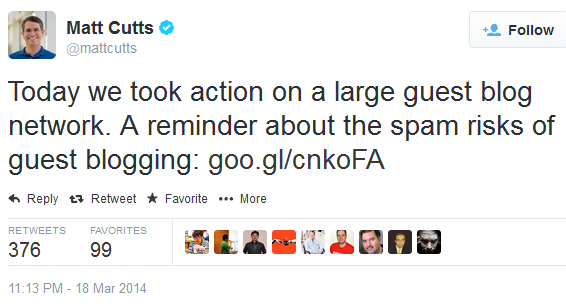
It doesn’t work that way. The difference between building a network properly, vs taking shortcuts and cutting corners, is the difference between 100% positive results and negative results, that penalize your website and offer no benefit whatsoever. This is coming from a guy who has managed thousands of blogs in the past, who took shortcuts and knows first-hand the result it produces.
 I’m writing to an audience who may be inclined to do things the blackhat way. My head tends to think in that way, and whenever I read about Rand Fishkin blurting out various Google talking points — sounding as if they’re pushing an agenda of morals to do things the “right” way, as opposed to simply trying to nail Google’s algorithm for the best rankings possible, I find it a bit of a turn-off. I’m not about doing things whitehat or blackhat, I just want to know what works — period. I also tend towards lasting results. When you do something that is a short-term gig, that’s more of a job. Building something that has a lasting value and pays dividends, that is more what I’m after.
I’m writing to an audience who may be inclined to do things the blackhat way. My head tends to think in that way, and whenever I read about Rand Fishkin blurting out various Google talking points — sounding as if they’re pushing an agenda of morals to do things the “right” way, as opposed to simply trying to nail Google’s algorithm for the best rankings possible, I find it a bit of a turn-off. I’m not about doing things whitehat or blackhat, I just want to know what works — period. I also tend towards lasting results. When you do something that is a short-term gig, that’s more of a job. Building something that has a lasting value and pays dividends, that is more what I’m after.
So then, let’s talk about blog networks of web2.0 free blogs, or private blog networks you construct yourself, and how to make them profitable and last a long time. If you build this yourself for the purpose of manipulating the SERPs, Google is going to be looking to completely discount your links, and would most likely tack on a penalty. We’re going to avoid this.
A patent issued in 2014 discusses “nodes”. A node could be a website, or a subdomain directory on a blog like Blogger, WordPress or Tumblr. Under certain circumstances, Google will determine associations between groups of websites and then cluster them into groups if they are similar enough. The patent mentions this as criteria for grouping: For example, the determination of affiliation can be based on node graph structure, similarity of node content (e.g., text or structure), ownership records, manually entered information, or other factors.
Before we start talking about how to avoid getting our sites “grouped” — what are the potential penalties of these nodes being associated together? Google’s patent states this:

“Yet another aspect of the invention includes identifying a plurality of linked nodes, identifying clusters of affiliated nodes, and assigning ranking values to a first node based on the ranking values of linking nodes that link to the first node, wherein an amount of rank assigned based on the ranking values of linking nodes is reduced when the linking nodes are in a same cluster and wherein the amount of rank assigned based on the linking nodes that are in a same cluster is reduced by contributing an amount of rank to the first node based on a maximum ranking value of the linking nodes in the same cluster.”
The “plurality of linked nodes” is a group of sites, whether a private blog network or free web2.0s, that have been associated together. The value that a cluster can pass along is limited by a threshold, or in other words, there’s only so much value one site can pass — and if the sites have been grouped together, that entire group of blogs is limited by the same threshold limit on how much benefit they can pass.
Therefore, the best-case scenario that is going to happen if all your blogs get associated together, is that the linking power of your 100 or 500 private blog network or free blog network suddenly becomes limited to having the benefit of only one blog, or in other words – the upper-bound threshold that one blog can pass along. The patent doesn’t address penalties that can be passed along, however, after all the blog networks that were slaughtered in 2014, I can tell you from personal experience that even your money site can be completely deindexed if it received a bulk of its links from a private blog network that was detected.
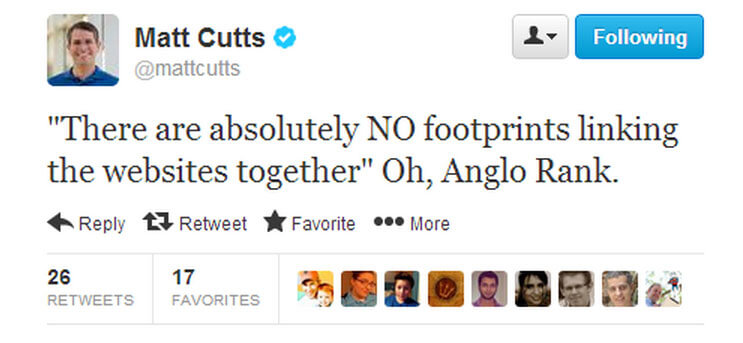 Let me mention here again how the patent says they can discover affiliated websites: For example, the determination of affiliation can be based on node graph structure, similarity of node content (e.g., text or structure), ownership records, manually entered information, or other factors. I’m going to discuss each of these below.
Let me mention here again how the patent says they can discover affiliated websites: For example, the determination of affiliation can be based on node graph structure, similarity of node content (e.g., text or structure), ownership records, manually entered information, or other factors. I’m going to discuss each of these below.
- node graph structure What is a “node graph structure”? Think of it as how these various sites link to each other. The structure of their linking can overlap if they only link to your money site, if they link to your money site and a fixed amount of other “authority” sites, in a similar fashion on each blog.
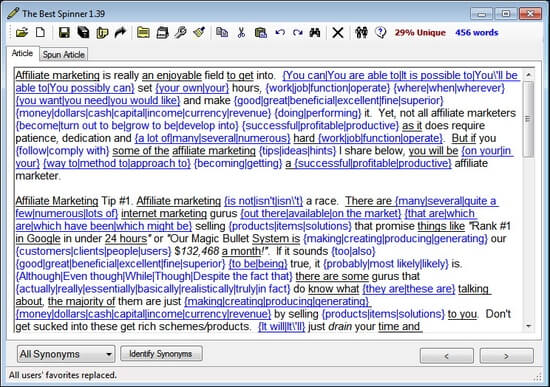
- similarity of node content (e.g., text or structure) Google has another patent on “diversity filtering”. According to that patent, “Diversity filtering is a process for discarding resources that provide essentially redundant information to the link quality engine.” In other words, Google knows all about a low quality article spin, or an article that was simply a re-writing of another article — changing the words into synonyms but essentially making the same points. Mix the two patents together, and here we have Google identifying blog networks based on finding content that isn’t diverse, that contain these bad article spins or low quality article re-writes.
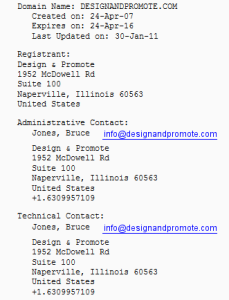 ownership records Here is another confirmation that Google grabs your Whois data. Obviously, if all the blogs are owned by the same person, this is a way to cluster them all together. However, consider that simply having the same DNS servers is a strong indication the blogs may be clustered, or having all been purchased from the same registrant, or all purchased at the same time, etc.
ownership records Here is another confirmation that Google grabs your Whois data. Obviously, if all the blogs are owned by the same person, this is a way to cluster them all together. However, consider that simply having the same DNS servers is a strong indication the blogs may be clustered, or having all been purchased from the same registrant, or all purchased at the same time, etc.- manually entered information Google can hunt you down from a spam report or stumbling across one of your blogs and then associate them all together manually.
- other factors It’s hard to imagine what else they would need, seeing the above can easily catch most blog networks. I’ll add in things such as your blogs having a similar template, similar boilerplate areas and there are bound to be far more.
What is the take-away here? I recommend building a blog network that is extremely diverse, where the content isn’t all on the same subjects, where the articles are not only unique, but diverse. Believe me, if short cuts worked here I’d be happy to do that, but short cuts will only get you into trouble. Even something like SEO hosting, where people buy hosting from a company who specializes in helping webmasters build private blog networks — will get you into trouble. Maybe you will build your sites perfectly, but your sites will be on the same IP addresses of irresponsible blog network creators who don’t know any better. Their sites will be found, and yours will be guilty by association.
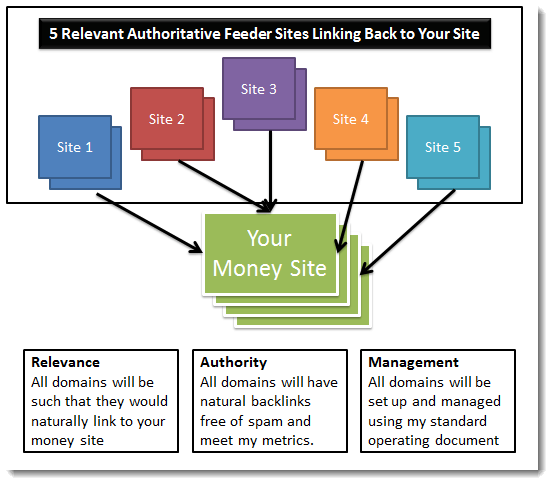
Building a blog network is a ton of work, even if you’re using low quality article spins and re-written content to populate them. Don’t waste all your efforts by making sites that can be associated together. If you’re building a free blog network, make sure the content is unique and diverse. If you’re building a blog network, make sure your content is unique and diverse, and also make certain you’re not leaving behind footprints such as where you’re hosting, how the sites interlink to each other, etc.
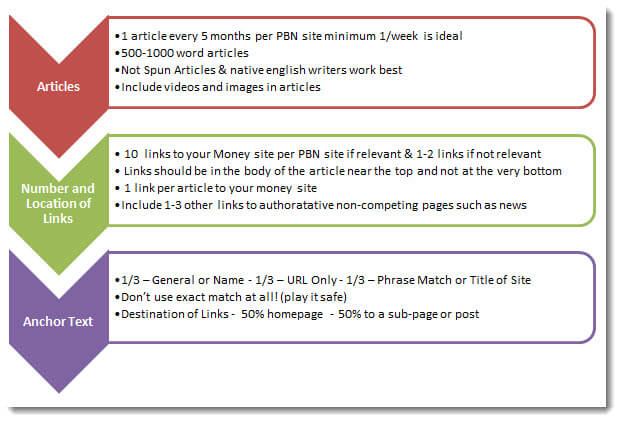
The only benefit you’re going to get from building your own blogs to link to your site is to make them extremely diverse, vary the types of information they present, they link to not only you but a variety of other authority sites (and not the same authority sites as your other blogs). The structure of the data must be different, each of your blogs having the same number of articles, discussing the same topics will get your blogs clustered together. I will eventually make a comprehensive series of articles on how to properly build your own blog network.

Comments